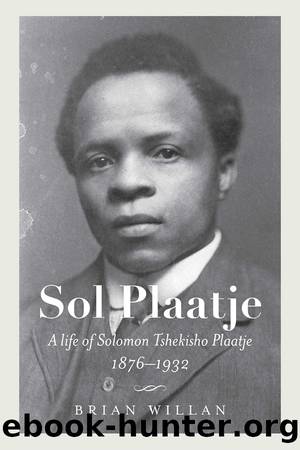Sol Plaatje by Brian Willan;

Author:Brian Willan;
Language: eng
Format: epub
Publisher: Lightning Source Inc. (Tier 3)
So Plaatje remained in London, still living in lodgings at 43 Tavistock Square in Bloomsbury. Despite being refused a passport, he had not given up hope of getting to America, but he worried about the gloomy news he received from home about the difficulties of his Brotherhood organisation in Kimberley. His financial situation again became acute: âI nearly died of hunger but Thaba Nchu came to my rescue on each occasionâ, he told Silas Molema. Daniel Jones, at University College, put some work his way, but it was much less frequent than before and cannot have brought in much. Alice Werner probably helped too. Once, when he visited the London School of Oriental Studies, where she now worked, he remembered meeting the famous West African educationist, J.E.K. Aggrey, on his way from America to Africa as a member of the Phelps Stokes Education Commission.62
In the middle of May 1920, there was welcome relief from an unexpected source: a £50 grant from the Royal Literary Fund to whom he had applied for help. The fund existed to support published authors who had fallen on hard times. His friend Dr T.E. Scholes had long been a beneficiary and this may well be how he heard about it. In making his case, Plaatje blamed his difficulties on the collapse of Tsala ea Batho during the war, and the impossibility of restarting it because of the continued high cost of paper. His savings, he told the fund, were exhausted and his current financial predicament âprecarious and uncertainâ. His application had the support of Daniel Jones, who spoke highly of his âpersonal character and of his abilityâ, and William Cross, who said he was a particularly deserving case since his publications were âvaluable from an educational and literary point of view, and are remarkable considering that no other South African native has contributed to English literatureâ.63
With his finances at least temporarily repaired, Plaatje was able to make a second trip to Scotland, visiting Modiri Molema in Glasgow on the day the young doctorâs first book, The Bantu Past and Present, was published. Subtitled âan ethnographical and historical study of the native races of South Africaâ, it was an ambitious attempt to describe the life of his people, drawing largely on published sources, and Molema hoped that it might help mitigate the âmisunderstanding and contemptâ to which he believed they were subjected. Plaatje was full of praise, and greatly enjoyed it: âGod only knows where you raked up these storiesâ, he wrote to him after his visit: âthey are so humorously put that often when I took it up after working tired and late and lie down about midnight it has kept me roaring with laughter some times till the small hours; and I have felt lonely since Mr Cross took it away.â64
The long delays Modiri Molema had experienced before the book was published brought back memories of his own struggles. âI had to wait 11 months fighting Harris who was battling to suppress Native Life
Download
This site does not store any files on its server. We only index and link to content provided by other sites. Please contact the content providers to delete copyright contents if any and email us, we'll remove relevant links or contents immediately.
Dearly: New Poems by Margaret Atwood(1660)
The Exiles by Christina Baker Kline(1419)
The Old Man and the Sea by Ernest Hemingway;(1007)
Harlem Shuffle by Colson Whitehead(973)
The Godfather by Mario Puzo & Anthony Puzo(867)
A Taste of Venice by Donna Leon(866)
My Boyfriend's Lesbian Mom: Book 7: Threesome Heat by Amanda Clover(861)
Howey, Hugh - Silo 03 - Dust by Hugh Howey(817)
Blind Tiger by Sandra Brown(806)
Drown Her Sorrows (Bree Taggert) by Melinda Leigh(727)
The Witness by Nichole Severn(701)
Man on Top by Laurelin Paige(700)
The Best American Short Stories 2020 by Curtis Sittenfeld(671)
Cursed in Love by Kenborn Cora & René Dani(629)
Towles, Amor - A Gentleman in Moscow by Towles Amor(612)
The Best American Mystery Stories 2020 by C. J. Box;Otto Penzler;(610)
Swag by Elmore Leonard(606)
Black Water Sister by Zen Cho(591)
Licking Lesbian Erotica: 5 Fifthy Explicit Lesbian Erotica Stories (First Time Lesbian Seduction) by L. Lauderdale(585)
